Maison >développement back-end >Tutoriel C#.Net >C# peut-il utiliser la réflexion pour attribuer des valeurs aux propriétés en lecture seule ?
C# peut-il utiliser la réflexion pour attribuer des valeurs aux propriétés en lecture seule ?
- 黄舟original
- 2017-02-17 10:54:511782parcourir
Conclusion : Vous pouvez
vérifier la démo comme suit :
using System;
using System.Collections.Generic;
using System.ComponentModel;
using System.Data;
using System.Drawing;
using System.Linq;
using System.Text;
using System.Windows.Forms;
namespace IconTest
{
public partial class Form2 : Form
{
public Form2()
{
InitializeComponent();
ReflectTest rt = new ReflectTest();
rt.GetType().GetProperty("ID").SetValue(rt, "Guid", null);
MessageBox.Show(rt.ID);
}
}
public class ReflectTest
{
private string id;
[ReadOnly(true)]
public string ID
{
get
{
return id;
}
set
{
id = value;
}
}
}
}
Sortie du programme winform en cours d'exécution :
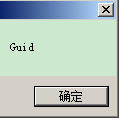
Petite note :
TypeDescriptor.GetProperties est utilisé pour définir une valeur qui n'a aucun effet :
TypeDescriptor.GetProperties(rt)["ID"].SetValue(rt, "Guid");
Alors pourquoi ? TypeDescriptor.GetProperties n'a-t-il aucun effet lorsqu'il est utilisé pour définir une valeur ?
Divisez le code ci-dessus en deux phrases suivantes :
PropertyDescriptor prop = TypeDescriptor.GetProperties(rt)["ID"]; prop.SetValue(rt, "Guid");
Single Cliquez pour suivre et vous pourrez trouver :
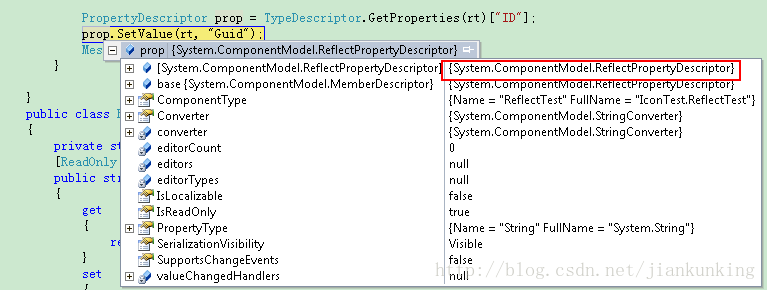
Après avoir obtenu l'instance de la classe abstraite PropertyDescriptor , lors de l'appel de la méthode SetValue, elle est appelée depuis sa sous-classe ReflectPropertyDescriptor.

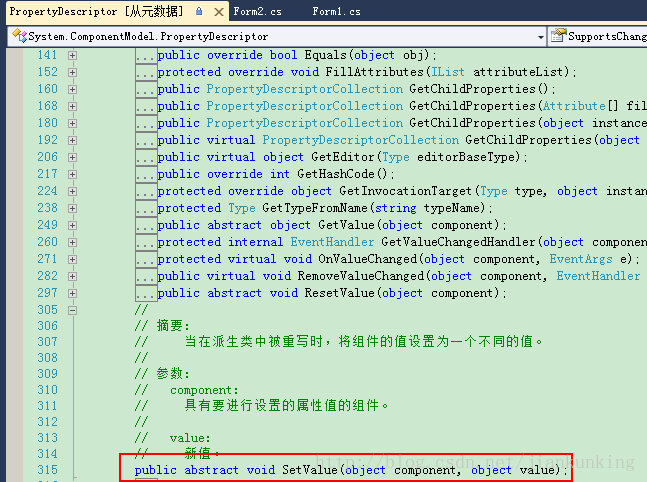
Et plus précisément L'implémentation se trouve dans la sous-classe : ReflectPropertyDescriptor. Recherchez ReflectPropertyDescriptor et SetValue à partir du code source Microsoft
public override void SetValue(object component, object value) {
#if DEBUG
if (PropDescUsageSwitch.TraceVerbose) {
string compName = "(null)";
string valName = "(null)";
if (component != null)
compName = component.ToString();
if (value != null)
valName = value.ToString();
Debug.WriteLine("[" + Name + "]: SetValue(" + compName + ", " + valName + ")");
}
#endif
if (component != null) {
ISite site = GetSite(component);
IComponentChangeService changeService = null;
object oldValue = null;
object invokee = GetInvocationTarget(componentClass, component);
Debug.Assert(!IsReadOnly, "SetValue attempted on read-only property [" + Name + "]");
if (!IsReadOnly) {
// Announce that we are about to change this component
//
if (site != null) {
changeService = (IComponentChangeService)site.GetService(typeof(IComponentChangeService));
Debug.Assert(!CompModSwitches.CommonDesignerServices.Enabled || changeService != null, "IComponentChangeService not found");
}
// Make sure that it is ok to send the onchange events
//
if (changeService != null) {
oldValue = SecurityUtils.MethodInfoInvoke(GetMethodValue, invokee, (object[])null);
try {
changeService.OnComponentChanging(component, this);
}
catch (CheckoutException coEx) {
if (coEx == CheckoutException.Canceled) {
return;
}
throw coEx;
}
}
try {
try {
SecurityUtils.MethodInfoInvoke(SetMethodValue, invokee, new object[] { value });
OnValueChanged(invokee, EventArgs.Empty);
}
catch (Exception t) {
// Give ourselves a chance to unwind properly before rethrowing the exception.
//
value = oldValue;
// If there was a problem setting the controls property then we get:
// ArgumentException (from properties set method)
// ==> Becomes inner exception of TargetInvocationException
// ==> caught here
if (t is TargetInvocationException && t.InnerException != null) {
// Propagate the original exception up
throw t.InnerException;
}
else {
throw t;
}
}
}
finally {
// Now notify the change service that the change was successful.
//
if (changeService != null) {
changeService.OnComponentChanged(component, this, oldValue, value);
}
}
}
}
}comme vous pouvez le voir sur le code out, l'attribut en lecture seule est ignoré directement. . . . . .
Alors, y a-t-il des restrictions sur PropertyInfo ?
La SetValue appelée par PropertyInfo est la suivante :
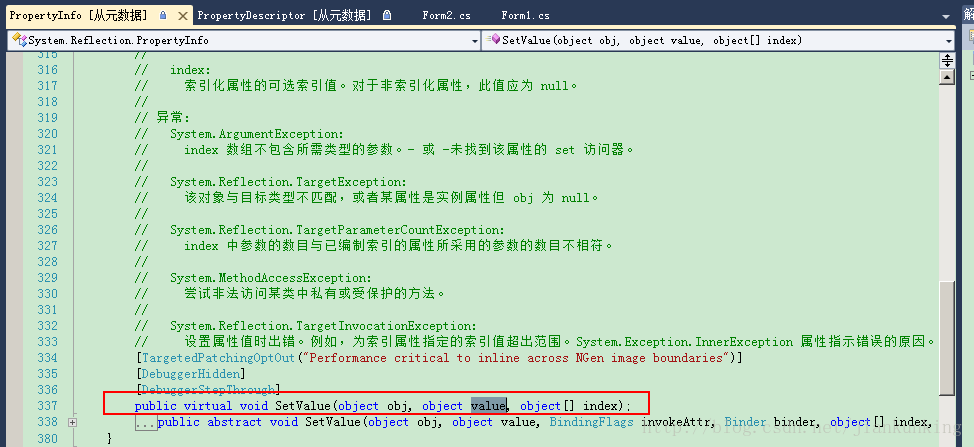
L'implémentation spécifique peut être trouvée dans le code open source de Microsoft comme suit :
[DebuggerStepThroughAttribute]
[Diagnostics.DebuggerHidden]
#if !FEATURE_CORECLR
[TargetedPatchingOptOut("Performance critical to inline across NGen image boundaries")]
#endif
public override void SetValue(Object obj, Object value, Object[] index)
{
SetValue(obj,
value,
BindingFlags.Public | BindingFlags.NonPublic | BindingFlags.Instance | BindingFlags.Static,
null,
index,
null);
}
[DebuggerStepThroughAttribute]
[Diagnostics.DebuggerHidden]
public override void SetValue(Object obj, Object value, BindingFlags invokeAttr, Binder binder, Object[] index, CultureInfo culture)
{
MethodInfo m = GetSetMethod(true);
if (m == null)
throw new ArgumentException(System.Environment.GetResourceString("Arg_SetMethNotFnd"));
Object[] args = null;
if (index != null)
{
args = new Object[index.Length + 1];
for(int i=0;i<index.Length;i++)
args[i] = index[i];
args[index.Length] = value;
}
else
{
args = new Object[1];
args[0] = value;
}
m.Invoke(obj, invokeAttr, binder, args, culture);
}Je n'ai pas vu l'appel PropertyInfo pourtant Quelles sont les limites de SetValue
PropertyInfo Méthode .GetSetMethod (booléenne)
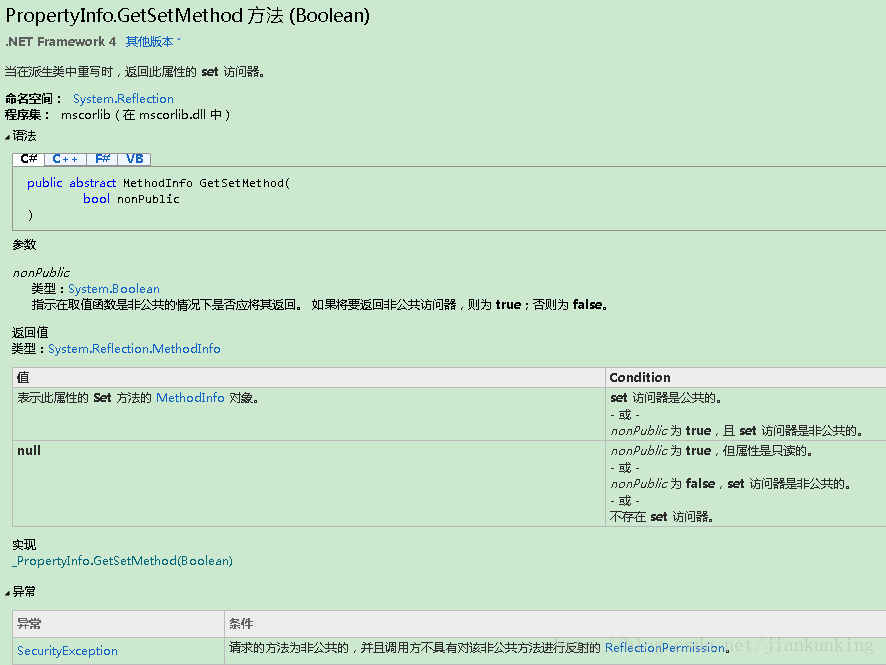
Ce qui précède est en C#. Pouvez-vous utiliser la réflexion pour attribuer des valeurs. aux propriétés en lecture seule ? Pour plus de contenu connexe, veuillez prêter attention au site Web PHP chinois (www.php.cn) !

